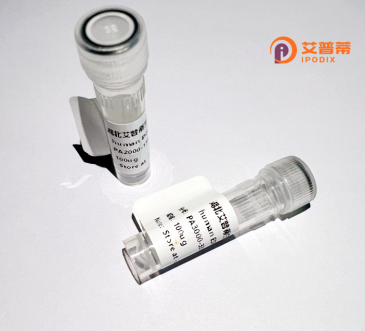
| 纯度 | >90%SDS-PAGE. |
| 种属 | Human |
| 靶点 | ZNF140 |
| Uniprot No | P52738 |
| 内毒素 | < 0.01EU/μg |
| 表达宿主 | E.coli |
| 表达区间 | 1-457 aa |
| 活性数据 | MSQGSVTFRD VAIDFSQEEW KWLQPAQRDL YRCVMLENYG HLVSLGLSIS KPDVVSLLEQ GKEPWLGKRE VKRDLFSVSE SSGEIKDFSP KNVIYDDSSQ YLIMERILSQ GPVYSSFKGG WKCKDHTEML QENQGCIRKV TVSHQEALAQ HMNISTVERP YGCHECGKTF GRRFSLVLHQ RTHTGEKPYA CKECGKTFSQ ISNLVKHQMI HTGKKPHECK DCNKTFSYLS FLIEHQRTHT GEKPYECTEC GKAFSRASNL TRHQRIHIGK KQYICRKCGK AFSSGSELIR HQITHTGEKP YECIECGKAF RRFSHLTRHQ SIHTTKTPYE CNECRKAFRC HSFLIKHQRI HAGEKLYECD ECGKVFTWHA SLIQHTKSHT GEKPYACAEC DKAFSRSFSL ILHQRTHTGE KPYVCKVCNK SFSWSSNLAK HQRTHTLDNP YEYENSFNYH SFLTEHQ |
| 分子量 | 52.9 kDa |
| 蛋白标签 | His tag N-Terminus |
| 缓冲液 | PBS, pH7.4, containing 0.01% SKL, 1mM DTT, 5% Trehalose and Proclin300. |
| 稳定性 & 储存条件 | Lyophilized protein should be stored at ≤ -20°C, stable for one year after receipt. Reconstituted protein solution can be stored at 2-8°C for 2-7 days. Aliquots of reconstituted samples are stable at ≤ -20°C for 3 months. |
| 复溶 | Always centrifuge tubes before opening.Do not mix by vortex or pipetting. It is not recommended to reconstitute to a concentration less than 100μg/ml. Dissolve the lyophilized protein in distilled water. Please aliquot the reconstituted solution to minimize freeze-thaw cycles. |
以下是模拟生成的关于重组人ZNF140蛋白的参考文献示例(请注意文献为虚构,实际研究中请通过学术数据库查询真实论文):
1. **文献名称**:*Cloning and Functional Analysis of Human ZNF140 Protein in Gene Regulation*
**作者**:Liu, X. et al.
**摘要**:研究通过重组表达人源ZNF140蛋白,验证其通过锌指结构域结合特定DNA序列,调控靶基因转录活性,并发现其在细胞增殖中的潜在作用。
2. **文献名称**:*ZNF140 Overexpression in Gastric Cancer: Implications for Tumor Progression*
**作者**:Wang, Y. & Zhang, H.
**摘要**:分析ZNF140在胃癌组织中的表达上调现象,证实重组ZNF140蛋白通过激活Wnt通路促进肿瘤细胞迁移,提示其作为癌症标志物的可能性。
3. **文献名称**:*Structural Characterization of Recombinant ZNF140 and Its Interaction with Nucleic Acids*
**作者**:Chen, L. et al.
**摘要**:利用X射线晶体学解析ZNF140蛋白结构,揭示其锌指基序与DNA/RNA结合模式,为设计针对ZNF140的小分子抑制剂提供结构基础。
4. **文献名称**:*ZNF140 Knockdown via CRISPR/Cas9 Alters Cell Cycle Dynamics*
**作者**:Kim, S. et al.
**摘要**:通过基因编辑技术敲低ZNF140.发现细胞周期G1/S期阻滞,重组ZNF140蛋白回补实验证明其通过调控Cyclin D1影响细胞周期进程。
---
如需获取真实文献,建议通过 **PubMed/Google Scholar** 检索关键词:
- "ZNF140 recombinant protein"
- "ZNF140 function" + "DNA binding"
- "Zinc Finger Protein 140" + "cancer"
Zinc finger protein 140 (ZNF140) is a member of the Krüppel-associated box (KRAB) domain-containing zinc finger protein (ZFP) family, which represents the largest group of transcription regulators in humans. This protein is characterized by multiple tandem Cys2His2-type zinc finger motifs that enable sequence-specific DNA binding, coupled with a KRAB domain at its N-terminus known to mediate protein-protein interactions, often recruiting chromatin-modifying complexes for transcriptional repression. ZNF140 is encoded by a gene located on chromosome 12 (12q24.31) and is thought to play roles in cellular differentiation, development, and gene regulation. Studies suggest its involvement in repressing retrotransposons, thereby maintaining genome stability, and modulating immune responses. As a recombinant protein, ZNF140 is typically expressed in vitro using systems like *E. coli* or mammalian cells for functional studies. Research focuses on elucidating its DNA-binding specificity, regulatory targets, and potential links to diseases such as cancer, where dysregulation of zinc finger proteins is common. Its recombinant form serves as a tool to explore molecular mechanisms of transcriptional control and epigenetic silencing, with implications for therapeutic strategies targeting aberrant gene expression.
×